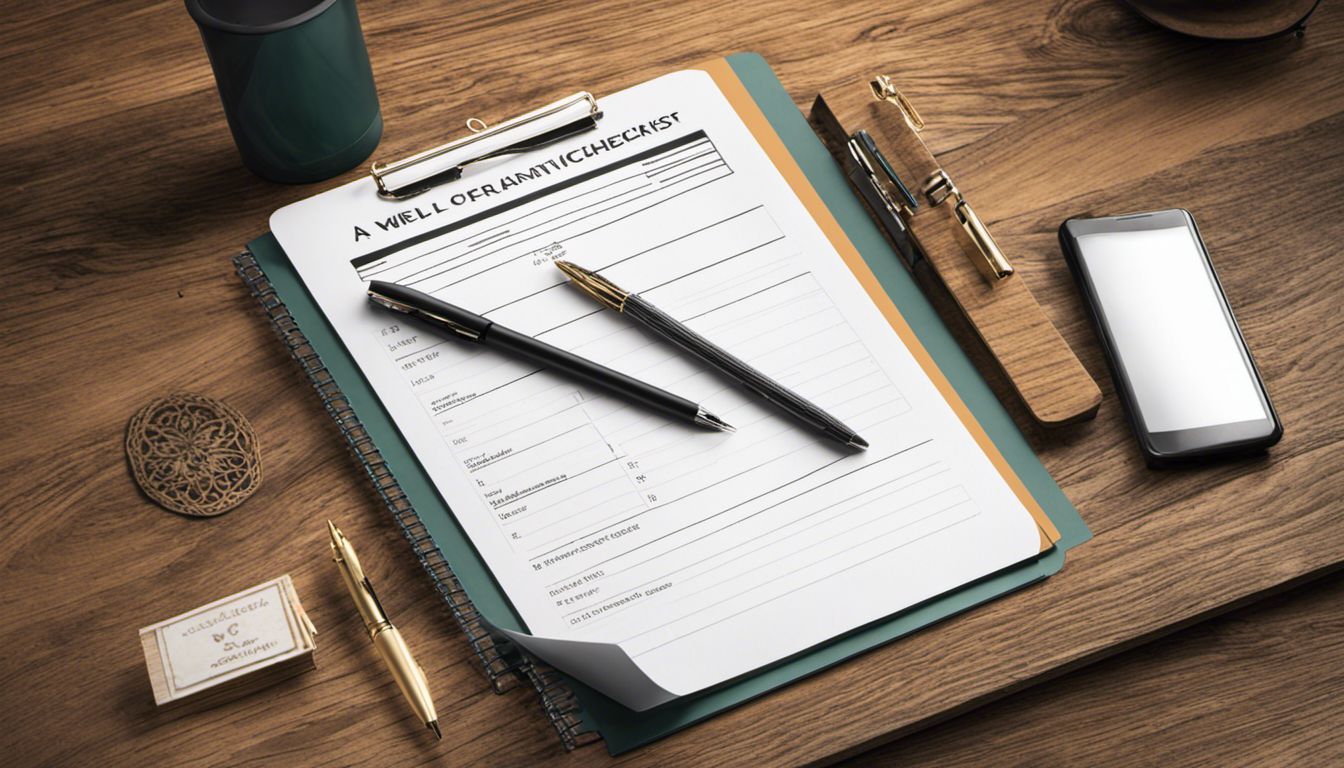The Ultimate Guide To Planning An Event: Step-by-Step Tips And Checklist

Are you about to host an event and feel overwhelmed with where to start? Planning an event, be it a small birthday bash or a big corporate gathering, can be more complex than most of us realise.
This guide is here to simplify that process for you, providing step-by-step tips along with a handy checklist. Dive into this ultimate guide and find your way towards planning the perfect event!
Key Takeaways
- The Ultimate Guide To Planning An Event provides step-by-step tips and a handy checklist to simplify the event planning process.
- Important steps in event planning include defining goals, establishing a budget, building an events team, picking a venue and date, and developing event branding.
- Clear event objectives are essential for guiding the planning process and ensuring that attendees have fun and get value out of the event.
- Insights from professional event planners emphasize thorough planning, attention to detail, building relationships with stakeholders, flexibility in dealing with challenges.
Understanding the Event Planning Process

The event planning process is like a map. It shows you where to start and how to reach your goal. First, it's good to know what you want from the event. What should happen? How must people feel when they leave? Write these things down on paper.
After that, decide how much money you can spend. Put someone in charge of each part of the plan - such as picking a place and date for the event, or branding it so people will want to come.
These tasks need careful thinking and hard work. It doesn't matter if the event is big or small; every detail counts!
https://www.youtube.com/watch?v=1vbqeH9SKQg
Event Planning Steps and Checklist

In this section, we will break down the essential steps and provide you with a comprehensive checklist to help you plan your event successfully.
https://www.youtube.com/watch?v=Q_Ece-fPKuw
Define goals and objectives
 Setting goals and objectives is where we start. We need clear aims for our event. These targets are the things we work towards. They guide all our planning steps.
Setting goals and objectives is where we start. We need clear aims for our event. These targets are the things we work towards. They guide all our planning steps.
Our goals should be solid and easy to check. This means we can see if we succeeded at the end of the event. For example, a goal could be "Get 200 people to come". So, when the day comes, you count how many people show up! That's how you know if your aim was met or not.
Establish an event budget

You need to work out your event's budget. The team should set this after they know the goals and objectives. This will help keep track of money spent during each stage of planning and running the event.
Important things to think about are venue costs, food expenses, cost for advertising, and any other extra services you might need. You must also manage all receipts and invoices as this helps adjust the budget when needed.
Keeping an eye on costs will make sure you do not spend more than what you have planned for.
Build your events team

Building your events team is a key step in planning any event. This group of people will help you with all parts of the process. You need to pick the right people for your team. Each person must have skills and talents that will make the work easier.
It's just like making a cake, each ingredient plays its own part! The team can include friends or workers who are good at setting goals, picking places for events or managing money.
With this amazing team by your side, you can plan an event that everyone will enjoy!
Pick your venue and date

You need to pick a venue and date for your event. It's a key task in event planning. First, do your homework. Look at different places. Talk to the people who run them. Think about where your event will be on the map too.
The right spot can make or break your plan!
Develop event branding

Developing event branding is like giving birth to a new story. It starts with creating an engaging name and theme for the event. These two things must talk about what your event wants to achieve.
They are the face of your brand strategy.
Brainstorming plays a big role here. You need lots of ideas! Make sure all your designs and messages link back to this theme. This creates a feel-good factor that guests will remember long after they go home.
Event promotion, identity, communication - all these have one thing in common: they carry your branding everywhere! Be consistent; let attendees see the same look on every piece of event material.
Importance of Clear Event Objectives

Clear event objectives guide all the steps of planning. You need to know what you want to do at your event. This will help you make the right choices and use your time well. It also lets you check if your event is a success once it's over.
For example, maybe you want people to learn about a new product at your event or meet others in their field. These are different goals that will shape how you plan everything, from talks to activities and even food and drinks! So setting clear goals goes hand in hand with making sure everyone has fun and gets value out of being there.
https://www.youtube.com/watch?v=YqCb_LK77Ig
Insights from a Professional Event Planner

Insights from a Professional Event Planner:
- Experienced event planners have valuable tips for success
- They emphasize the importance of thorough planning and organization
- Attention to detail is key in event management
- Building strong relationships with vendors, sponsors, and attendees is crucial
- Flexibility and adaptability are essential when dealing with unexpected challenges
Event Management and Execution

Plan your program, secure sponsors, exhibitors, and speakers, select tech tools, create a marketing plan, and determine your measurement and analytics.
Plan your program

To plan your program for an event, you need to carefully consider what activities and sessions will take place. Start by identifying the main objectives of your event and then decide on the topics and themes that align with those goals.
It's important to think about the flow of the program, ensuring that each session leads into the next seamlessly. Consider the duration of each activity and allocate enough time for breaks or networking opportunities.
Additionally, don't forget to schedule any special performances or entertainment that will enhance attendees' experience. By thoughtfully planning your program, you can create a cohesive and engaging event that meets your objectives.
Confirm sponsors, exhibitors, and speakers

It's important to confirm your sponsors, exhibitors, and speakers for your event. Sponsors provide financial support or other resources that you need for the event to be successful.
Exhibitors showcase their products or services, adding value and variety to the event experience. Speakers attract attendees with their expertise and insights, making your event more appealing.
Finalizing agreements and expectations with these key stakeholders ensures a smooth execution of the event and helps avoid any last-minute issues or surprises. By securing sponsors, exhibitors, and speakers early on in the planning process, you can establish a strong foundation for a successful event.
Identify and select tech tools

Planning an event involves using various tech tools to streamline the process and make it more efficient. Event management software, such as ProjectManager, is a powerful tool that can help organize and manage all the different aspects of event planning.
These tools can simplify tasks like creating an event planning checklist, coordinating logistics, managing budgets, and tracking progress. By utilizing event coordination software and organization tools, you can save time and effort while ensuring that your event runs smoothly.
Remember to choose tech tools that align with your specific needs and objectives to maximize their effectiveness in helping you plan a successful event.
Create a marketing and promotional plan

To ensure a successful event, creating a marketing and promotional plan is crucial. This plan should cover all stages of the event - from pre-event planning to post-event activities.
Start by setting clear goals and objectives for your event, along with allocating a budget for effective financial management. Utilize the power of your event speakers and their content to develop impactful marketing tactics.
By leveraging various marketing strategies, you can attract attendees, sponsors, exhibitors, and media coverage. Remember to include measurable goals in your plan and regularly analyze the results to make necessary adjustments for future events.
Determine your measurement and analytics
To measure the success of your event, you need to determine how you will track and analyze key data. This includes metrics like attendee engagement, ticket sales, social media reach, and feedback surveys.
By setting up tracking systems and using analytics tools, you can see what worked well and areas for improvement. For example, by analyzing attendee feedback, you can identify which sessions were most popular or what aspects of the event resonated with attendees.
These insights will help you make informed decisions for future events and ensure that your goals are being met effectively.
It's important to use event management software or tools specifically designed for measuring event performance. These tools allow you to collect data from multiple sources in one place and generate reports that provide valuable insights at a glance.
With this information, you can easily assess the overall success of your event by comparing it against your goals and objectives. Remember to regularly review these analytics throughout the planning process so that adjustments can be made as needed.
Event Day and Post-Event

The final preparations and execution of the event are crucial for its success, ensuring everything runs smoothly on the day. Afterward, there is important post-event follow-up and analysis to gather feedback and evaluate the event's impact.
The home stretch and final preparations
In the final stages of event planning, it's time for the home stretch and final preparations. This is when you dot all the i's and cross all the t's to ensure everything goes smoothly on the big day.
It involves finalizing details, confirming arrangements, and fine-tuning logistics. You'll need to coordinate with your team to make sure everyone is on board and ready for action.
One important task during this time is finalizing the event schedule, making sure each activity has a designated time slot. Once everything is in place, it's time to assess the success of your event through post-event evaluation and conduct a debriefing session with your team to learn from the experience.
Event day execution
On event day, it's time to put all your planning into action. This is when you oversee the implementation and execution of your event. Use your event timeline and checklist to stay organized and ensure that everything runs smoothly.
Coordinate with your team members to delegate tasks, allocate resources, and prioritize important activities. By following a detailed plan, you can handle last-minute adjustments or issues that may arise.
Don't forget to utilize event management software as a helpful tool for managing logistics on the day of the event. With proper preparation and coordination, you can confidently execute an amazing event that meets your objectives and leaves a lasting impression on attendees.
Post-event follow-up and analysis
After your event is over, it's important to conduct a post-event follow-up and analysis. This involves evaluating how successful the event was and gathering feedback from attendees.
By reviewing attendee feedback and assessing the event’s impact, you can identify areas for improvement. You may also contact attendees to gather their testimonials, which can be used for future promotion.
Effective post-event follow-up and analysis helps you enhance attendee satisfaction and make improvements for future events. It's an essential part of the event planning process that allows you to measure success and continue providing exceptional experiences.
Additional Resources and Tools

To help you plan your event effectively, here are some additional resources and tools that can assist you:
1. Gantt charts: These visual timelines help you map out various tasks and their deadlines, ensuring nothing falls through the cracks.
2. Kanban boards: These boards allow you to organize and track different stages of your event planning process, from ideation to execution.
3. Task lists: By breaking down your event into smaller tasks, you can create a detailed to-do list that ensures everything gets done on time.
4. Calendars: Utilizing calendars helps with scheduling key milestones, meetings, deadlines, and other important dates related to your event.
5. Event planning templates: Accessing free templates can save valuable time when it comes to creating budgets, schedules, checklists, and other necessary documents for successful event planning.
6. Event management software: Investing in specialized software streamlines the entire process by automating tasks like attendee registration, ticket sales tracking, marketing campaigns monitoring etc.
Remember these resources and tools as they will support in organizing every aspect of your event efficiently!
Conclusion

In conclusion, "The Ultimate Guide To Planning An Event: Step-by-Step Tips And Checklist" is a valuable resource for anyone looking to organize an event. With its comprehensive checklist and practical tips, it provides the necessary guidance for successful event planning.
By following the step-by-step process outlined in this guide, event organizers can confidently plan their events and ensure a seamless execution from start to finish. Whether you're organizing a birthday party or a large-scale conference, this guide has got you covered with all the essential information you need.
Happy planning!
FAQs
1. How do I start planning an event?
To start planning an event, make a checklist of the tasks you need to complete, such as setting a date, creating a budget, and deciding on the venue.
2. What should be included in an event checklist?
An event checklist should include tasks such as sending invitations, arranging for catering and entertainment, organizing decorations, and creating a timeline for the day of the event.
3. How far in advance should I start planning an event?
It is recommended to start planning an event at least 6-8 weeks in advance to ensure enough time to secure vendors, send invitations, and make necessary arrangements.
4. Do I need any permits or licenses for my event?
Depending on the nature of your event and local regulations, you may need permits or licenses for activities like selling alcohol or setting up food stalls. Check with your local authorities to determine any requirements.
5. What are some tips for staying organized during the event planning process?
Some tips for staying organized during the event planning process include keeping all important documents in one place, using digital tools like spreadsheets or project management apps to track progress, and regularly communicating with all stakeholders involved in the event.












Leave Reply